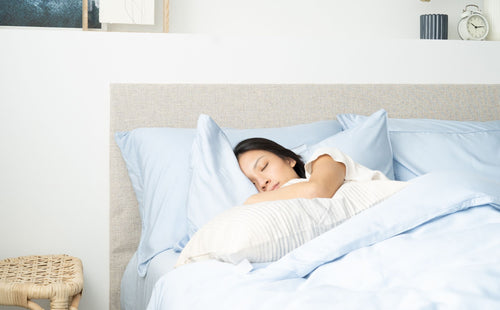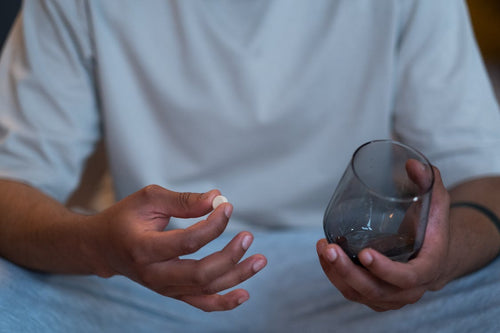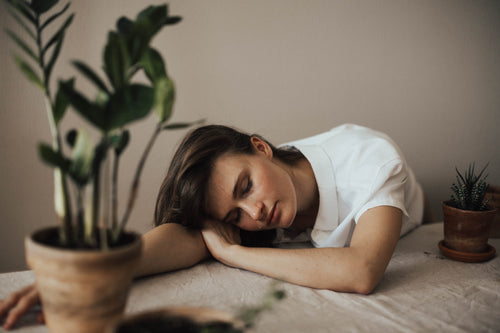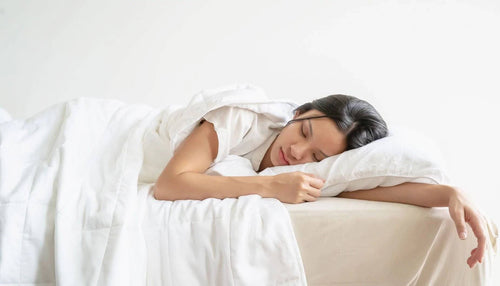Do you find yourself tossing and turning in bed, struggling to catch those elusive Z's night after night? In today's fast-paced world, sleep problems have become an all-too-common issue for many of us. The consequences of sleep deprivation can be far-reaching, impacting our mood, productivity, and overall well-being. But worry not, for there's a glimmer of hope to restore those blissful, restful nights!
In this article, we will dive into the realm of sleep aids, offering you a curated list of effective solutions to help you bid farewell to those sleepless nights. From home remedies for deep sleep to tried-and-tested innovations, we've got you covered. So let’s get started!

Featuring Weavve’s Signature TENCEL™ Classic Set in Sky Blue
How Sleep Aids Work
Sleep aids, also known as sleep medications or hypnotics, are designed to assist individuals in overcoming sleep difficulties and achieving a more restful night's sleep. They work by influencing certain neurotransmitters in the brain, which regulate the sleep-wake cycle and overall sleep patterns.
Most sleep aids enhance the activity of Gamma-Aminobutyric Acid (GABA), a neurotransmitter that slows down brain activity, promoting relaxation and drowsiness. By increasing GABA's effects, sleep aids help calm the mind and body, making it easier to fall asleep and stay asleep.
Common types of sleep aids include over-the-counter antihistamines, which have sedative properties, and prescription medications like benzodiazepines and non-benzodiazepine hypnotics. Additionally, some sleep aids target specific sleep problems, such as sleep apnea or restless legs syndrome, to address the underlying causes.

Featuring Weavve’s Signature TENCEL™ Classic Set in Lilac Mauve
Best Sleep Aids to Help You Catch Those Zzzs
Prescription Medications
Prescription medications encompass two main categories: benzodiazepines and non-benzodiazepine hypnotics or Z drugs. Benzodiazepines, like temazepam and lorazepam, work by enhancing GABA activity, inducing sedation, and reducing anxiety.
Non-benzodiazepine hypnotics, such as zolpidem and eszopiclone, target specific receptors in the brain to promote sleep. These medications are typically intended for short-term use due to the risk of dependency and side effects.
Be mindful that before considering any sleep aid, it is imperative to consult medical professionals to obtain a proper prescription tailored to individual needs and health conditions.

Image by JESHOOTS.com from Pexels
Z Drugs
Z drugs, also known as non-benzodiazepine hypnotics, are a widely prescribed class of sleep aids that act on the same brain receptors as benzodiazepines. The difference is they have fewer side effects and a shorter duration of action. This is why Z drugs are typically recommended for short-term use to treat insomnia and help individuals fall asleep faster and stay asleep longer.
Benzodiazepines
Just like Z drugs, Benzodiazepines are a class of prescription sleep aids commonly prescribed for short-term use to treat insomnia and other sleep disorders. Examples of benzodiazepines include medications like temazepam and triazolam.
While effective in inducing sleep, they come with some potential drawbacks. Long-term use can lead to dependency, tolerance, and withdrawal symptoms. Due to these concerns, healthcare professionals often advise limited use and cautious monitoring when prescribing benzodiazepines for sleep problems.
It's essential to weigh the benefits and risks and explore alternative sleep aids or behavioural therapies for a well-rounded approach to sleep health.

Image by Suzy Hazelwood from Pexels
Orexin Rreceptor Antagonists
These are a novel class of sleep aids that target the brain's orexin system, which regulates wakefulness and sleep-wake transitions. By blocking the action of orexin, these medications promote drowsiness and facilitate the onset and maintenance of sleep. Unlike traditional sleep aids, orexin receptor antagonists offer a different mechanism of action, making them a promising option for those who experience difficulties with falling asleep or staying asleep.
Although they are relatively new, research indicates that these sleep aids may have a lower risk of dependency and fewer side effects compared to some other medications. However, as with any sleep aid, it is crucial to consult a healthcare professional before use.
Antidepressants
Antidepressants, primarily prescribed to treat depression and related mood disorders, can also serve as sleep aids for individuals experiencing sleep disturbances associated with these conditions. Certain antidepressants, such as trazodone and amitriptyline, possess sedative properties that can promote drowsiness and help improve sleep quality.

Image by Tima Miroshnichenko from Pexels
By modulating neurotransmitters like serotonin and norepinephrine, these medications can address the underlying factors contributing to insomnia or disrupted sleep patterns. It's important to note that using antidepressants as sleep aids should be done under the guidance of a healthcare professional, as their efficiency and side effects may vary depending on individual needs and medical history.
Sleep Supplements
Sleep supplements are a category of sleep aids that offer natural alternatives to traditional medications. These supplements typically contain herbs, vitamins, minerals, or amino acids that are believed to promote relaxation and improve sleep quality. Common ingredients include melatonin, a hormone that regulates sleep-wake cycles, valerian root, chamomile, and magnesium.
Sleep supplements are often available over-the-counter and are considered a gentler option for those seeking non-pharmaceutical solutions for their sleep problems. While they may be effective for some individuals, it's essential to consult a healthcare professional before using them, especially if you have underlying health conditions or are taking other medications.

Image by Polina Tankilevitch from Pexels
Melatonin
If anyone asks ‘what is the best natural sleep aid’ melatonin could likely be a popular answer. As a hormone produced by the pineal gland in response to darkness, it signals our body when it's time to sleep.
Melatonin supplements, available over-the-counter, are often used to address sleep disorders like insomnia and jet lag. By promoting drowsiness and reducing the time it takes to fall asleep, melatonin can be an effective solution for those seeking a gentle and non-habit-forming sleep aid.
Valerian Root
Valerian root is a herbal sleep aid derived from the Valeriana officinalis plant. Known for its calming properties, Valerian root has been used for centuries to alleviate sleep difficulties and promote relaxation.
It works by increasing the levels of GABA, a neurotransmitter that helps regulate anxiety and stress, thus inducing a sense of tranquillity and preparing the body for sleep. Valerian root is available in various forms, such as capsules, teas, and tinctures.

Image by lil artsy from Pexels
Magnesium
In the world of supplements, magnesium never leaves the spotlight. As a natural sleep aid, this vital mineral helps regulate neurotransmitters that calm the brain and reduce stress, paving the way for improved sleep quality.
It acts as a relaxant, easing muscle tension and promoting a sense of tranquillity, making it easier to fall asleep. However, magnesium sleep aid side effects can include drowsiness, nausea, vomiting, etc. so make sure to consult a physician or do your research before consumption.
Glycine
Glycine, a naturally occurring amino acid, has gained quite a bit of attention as a potential sleep aid. Found in foods and available as a supplement, glycine is believed to have a calming effect on the brain by acting as an inhibitory neurotransmitter. Apart from reducing the time taken to fall asleep, it can also enhance daytime alertness.
Moreover, glycine is considered safe and well-tolerated, making it an attractive option for those seeking a natural sleep aid. Still, as with any supplement, consulting a healthcare professional is recommended before use.

Image by Meruyert Gonullu from Pexels
Cannabidiol (CBD)
Cannabidiol (CBD) is a natural compound sourced from the cannabis plant, gaining popularity as a potential sleep aid. Unlike its cousin, THC, CBD is non-psychoactive and does not induce a "high." Instead, it interacts with the body's endocannabinoid system, which plays a role in regulating various functions, including sleep.
Ginkgo biloba
This herbal remedy taken from the Ginkgo biloba tree, is a unique inclusion in the realm of sleep aids. Although primarily known for its potential cognitive benefits, Ginkgo biloba has also shown promise in improving sleep quality.
This natural supplement is believed to enhance blood flow to the brain and promote relaxation by influencing neurotransmitters. As a result, some individuals experience improved sleep patterns and reduced sleep disturbances.

Image by Physical Pixel from Pexels
L-theanine
Now, we have a natural sleep aid that is gaining popularity for its calming properties and potential to improve sleep quality: L-theanine. Found in tea leaves, particularly green tea, it is an amino acid known for its relaxation-inducing effects. By increasing levels of serotonin, dopamine, and GABA in the brain, L-theanine helps reduce anxiety and stress, leading to a more tranquil state conducive to falling asleep.
Unlike some sleep medications, L-theanine does not cause drowsiness during the day and is non-addictive. As an effective and natural alternative, it offers promise for those seeking to enhance their sleep without relying on traditional pharmaceutical sleep aids.
Tryptophan
Tryptophan, a naturally occurring amino acid found in certain foods and dietary supplements, is a unique sleep aid that influences sleep through its role in the production of serotonin and melatonin. Serotonin helps regulate mood and relaxation, while melatonin plays a key role in signalling the body when it's time to sleep.

Image by Juan Salamanca from Pexels
By increasing tryptophan intake, either through food sources like turkey, milk, and bananas or as a supplement, individuals may experience improved sleep quality and reduced insomnia symptoms. However, it's essential to use tryptophan supplements cautiously and consult with a healthcare professional, as interactions with other medications can occur.
Passionflower
If you're seeking for a non-prescription sleep aid, passionflower is for you. Derived from the Passiflora plant, this has been used for centuries to alleviate insomnia and promote relaxation. It is available in various forms, including teas, extracts, and supplements.
Sleep Aid Devices
Sleep aid devices are innovative sleep gadgets designed to improve slumber and address common sleep problems. These devices use inventive technology to create a conducive sleep environment and promote relaxation.
Bedside Lamp

Image by Anna Nekrashevich from Pexels
A bedside lamp may seem like an unlikely sleep aid, but its role in promoting better sleep should not be underestimated. Certain bedside lamps come equipped with special features, like colour temperature adjustment and dimming settings, to create a soothing and sleep-friendly environment.
Additionally, some bedside lamps offer wake-up simulation. Imagine this: warm, dim light in the evening to help you unwind then it gradually brightens in the morning to mimic a natural sunrise, gently awakening you from sleep.
Wearable Devices
Wearable devices offer innovative solutions to track and improve sleep quality. From smartwatches that monitor sleep patterns and provide sleep scores to headbands and earbuds that deliver calming sounds or white noise, these devices help you relax with ease.
Some wearable therapy glasses also use specific light wavelengths to regulate circadian rhythms and combat insomnia.

Image by energepic.com from Pexels
Speaker with Integrated Isotonic Sound Technology
Looking for a cutting-edge sleep aid that combines audio innovation with relaxation techniques? This device might make the cut! It emits soothing sounds, specifically designed to match the natural rhythm of brain waves during different sleep stages.
By incorporating isotonic sound technology, it promotes a state of tranquillity, easing the mind into sleep. These gentle, calming sounds can act as white noise machines that drown out external disturbances, reducing sleep interruptions.
Humidifier
You’re probably already familiar with a humidifier but how exactly does it help improve sleep quality? A simple answer is improved air quality enhances respiratory function, making breathing easier during sleep.

Image by cottonbro studio from Pexels
This device adds moisture to the air, creating a comfortable and soothing sleep environment, especially in dry climates or during winter months when indoor air tends to be drier. It also helps alleviate dry nasal passages, throat irritation, and reduces snoring. Anti-Snoring Mouthpiece
Weighted Blankets
Weighted blankets, a popular type of sleep aid, have gained widespread recognition for their calming effects on sleep. These blankets, also called as weighed blankets or gravity blankets, are filled with materials like glass beads or plastic pellets, distributed evenly throughout the fabric.
The extra weight creates gentle pressure that makes you feel like you’re being hugged or swaddled. The deep pressure stimulation can also promote the release of neurotransmitters like serotonin and dopamine, helping to reduce anxiety and improve sleep quality.
Featuring Weavve’s Weighted Blanket
Anti-Snoring Mouthpiece
Is snoring and mild to moderate sleep apnea among your sleep problems? This custom-fit device is worn in the mouth during sleep and works by repositioning the jaw and tongue to keep the airway open. It reduces the vibrations in the throat that cause snoring, promoting uninterrupted airflow and more restful sleep. Anti snore sleep aids are often preferred for their non-invasive nature and ease of use.
Sleep Mask
Striking lights could be one of the reasons you’re having trouble drifting off to sleep. A great solution is to wear sleep masks. They are soft, comfortable, stylish as well. The bonus part is they are portable and easy to use, making them suitable for travel or daytime napping!
Featuring Weavve’s Vegan Silk Eye Mask
Motion Pillow
Ever wondered why it’s called a motion pillow? This innovative pillow utilises advanced technology to detect snoring sounds and gently adjusts its internal air chambers to shift the sleeper's head position, encouraging a more open airway passage. Using one not only provides uninterrupted sleep for you but also your sleep partner, if you have any.
Alternatively, you can rest your head on smooth silk pillows to help you have a great night’s sleep. They feel luxurious, plus, silk bedding can be good for your skin and hair.
Scents or Aromatherapy
Scents have a powerful impact on our emotions and well-being, making them a natural ally in the quest for better sleep. By inhaling or applying certain scents, you stimulate one of the senses for better sleep and trigger a calming response that eases anxiety and induces sleepiness.

Featuring Weavve’s Sleep Spray
Aromatherapy sleep sprays, scented candles, and essential oils come in a variety of fragrances that cater to individual preferences.
Lavender
When it comes to popular natural remedies for sleep troubles, lavender can’t go missing on the list. It offers a soothing and aromatic solution to bedtime woes. Lavender sleep aids come in various forms, such as essential oils, sprays, and herbal teas. Studies have shown that inhaling lavender essential oil can lead to improved sleep quality and overall sleep duration.
Jasmine
Jasmine, a fragrant flowering plant, is renowned not only for its delightful aroma but also for its potential sleep-promoting properties. The sweet scent of jasmine has been studied for its calming effects, which may help reduce anxiety and improve sleep quality. Jasmine essential oil and extracts are often used in aromatherapy to create a relaxing environment conducive to better sleep.

Image by Karolina Grabowska from Pexels
Chamomile
Derived from the daisy-like flowers of the chamomile plant, this natural remedy is known for its mild sedative effects, helping to alleviate insomnia and promote relaxation. Chamomile can be consumed as a soothing tea, allowing its essential compounds to interact with the brain's receptors, inducing a sense of tranquillity.
Ylang Ylang
Ylang Ylang is a floral essential oil known for its soothing and aromatic properties, making it a popular natural sleep aid. Extracted from the flowers of the Cananga odorata tree, Ylang Ylang oil promotes relaxation and helps reduce stress and anxiety, enabling a calmer mind for better sleep. Its sweet and exotic scent can be used in an aromatherapy diffuser for sleep or added to a warm bath before bedtime.
Rose
In the realm of sleep aids, rose-infused products have emerged as a natural and calming remedy to promote better sleep. Rose, with its soothing fragrance and therapeutic properties, is often used in essential oils, sleep sprays, and herbal teas. The scent of rose has been linked to stress reduction and relaxation, making it an excellent choice for those seeking a restful sleep.

Image by Artem Malushenko from Pexels
Clary Sage
Clary Sage, an aromatic herb with relaxing properties, is popular in aromatherapy oils for sleep. Its essential oil, derived from the plant's flowers and leaves, contains active ingredients like linalyl acetate and linalool, which promote tranquillity and stress reduction. Apart from aromatherapy, it can also be applied topically.
Cedar Extract
Got those racing thoughts right when you’re trying to get some shuteye? Cedar extract can help ease anxious thoughts that often disrupt sleep. Sourced from the bark of cedar trees, cedar extract is rich in soothing compounds that promote relaxation. It acts as a mild sedative, making it a gentle yet effective choice for individuals desiring a chemical-free alternative.
Sandalwood
Sandalwood essential oil is well-known for its calming properties, which can help reduce anxiety and stress. Sandalwood can also be used in various other forms, such as essential oils for aromatherapy, incense sticks, or even as a component in herbal sleep teas.

Image by Valery Anatolievich from Pexels
Peppermint
Who doesn’t love the scent of peppermint? This fragrant herb renowned for its soothing properties, offers a natural remedy for sleep aid seekers. Peppermint tea, in particular, is a popular natural remedy for improving sleep quality.
Its calming effects on the digestive system can ease discomfort and promote relaxation before bedtime. The presence of menthol in peppermint aids sends you in a relaxed state.
Bergamot
Bergamot is a natural sleep aid derived from the peel of the bergamot orange fruit. Widely recognized for its calming and soothing properties, bergamot is often used as an essential oil or in herbal teas to promote relaxation and alleviate anxiety.
Its pleasant citrus aroma acts as an aromatherapy aid, reducing stress levels and facilitating a more peaceful bedtime routine. Studies suggest that inhaling bergamot oil may positively impact mood and sleep quality by encouraging the body to unwind before sleep.

Image by Tom Fisk from Pexels
How to Choose the Best Sleep Aid for You
Choosing the best sleep aid tailored to your needs is important for a relaxing sleep. Firstly, consider your age and specific conditions. For older adults, gentle herbal remedies or melatonin supplements may be ideal, while younger individuals may benefit from over-the-counter antihistamines.
Secondly, for jet lag or shift work sleep disorder, short-term use of prescription sleep medications might help reset your internal clock. Always consult a healthcare professional before trying any sleep aid, especially if you have underlying health conditions.
Other Tips for Better Sleep
Here are some other useful tips for properly catching those Z’s!
Create a Sleep-Friendly Environment

Featuring Weavve’s Signature TENCEL™ Deluxe Set in Cloud White
Transform your bedroom into a sleep haven by keeping it cool, dark, and quiet. Invest in blackout curtains, earplugs, or a white noise machine to block out disturbances and optimise your sleep environment for a night of uninterrupted rest.
One pro tip is to invest in high-quality hotel bedding that gives you that luxuriously indulging experience.
Establish a Relaxing Bedtime Routine
Create a calming pre-sleep ritual to signal your body that it's time to wind down. Engage in soothing activities like reading a book, taking a warm bath, or practising gentle stretching or meditation.
This routine will help your mind and body transition from the day's hustle to a state of relaxation, making it easier to fall asleep faster.
Limit Screen Time Before Bed

Featuring Weavve’s Signature TENCEL™ Classic Set in Midnight Blue
The blue light emitted by phones, tablets, and computers can disrupt the production of the sleep hormone melatonin. Minimise screen exposure at least an hour before bedtime to prevent sleep disturbances and allow your body to produce adequate melatonin for a more restful sleep.
Watch Your Diet and Fluid Intake
Avoid heavy meals close to bedtime as they can cause discomfort and disrupt sleep. Additionally, limit caffeine and alcohol consumption, especially in the evening. This is not a sleep myth but a fact as they can interfere with your sleep cycle and quality of sleep.
Engage in Regular Physical Activity
Featuring Weavve’s Signature TENCEL™ Deluxe Set in Fern Green
Incorporate regular exercise into your daily routine, but aim to finish your workout a few hours before bedtime. Exercise promotes better sleep by reducing stress and anxiety while boosting the release of sleep-regulating hormones, enhancing your chances of falling asleep faster and experiencing deeper rest.
FAQs
What is the best sleeping aid that works?
The best sleeping aid that works varies depending on individual needs and preferences. Some find relief with over-the-counter antihistamines like diphenhydramine, while others benefit from prescription medications such as zolpidem or trazodone. Exploring natural options like melatonin or valerian root may also prove effective. Consulting a healthcare professional is recommended to find the most suitable solution.
What are some strong sleep aids?
Some strong sleep aids include prescription medications like benzodiazepines and non-benzodiazepine hypnotics. These medications are usually recommended for short-term use and should be taken under the supervision of a doctor due to their potential side effects and risk of dependency.
Is taking melatonin safe every night?
Taking melatonin every night is generally considered safe for short-term use. However, it's advisable to consult a healthcare professional for appropriate dosages and to ensure it doesn't interfere with any existing health conditions or medications.
Is it okay to take sleeping pills every night?
It is not recommended to take sleeping pills every night without consulting a healthcare professional. Regular use may lead to dependence, reduced effectiveness, and potential side effects. Long-term reliance on sleep aids may hinder addressing underlying sleep issues.
How can I stay asleep for 8 hours?
To stay asleep for a full 8 hours, establish a consistent sleep schedule by going to bed and waking up at the same time daily. Create a relaxing bedtime routine, avoid caffeine and electronics before bed, and ensure a comfortable sleep environment. Consider using sleep aids if sleep troubles persist, under professional guidance.








































